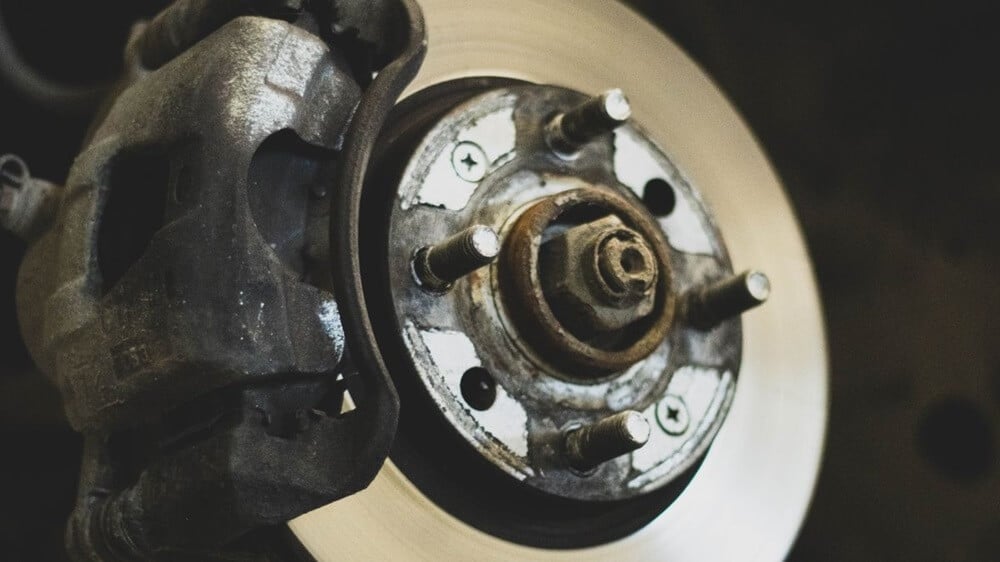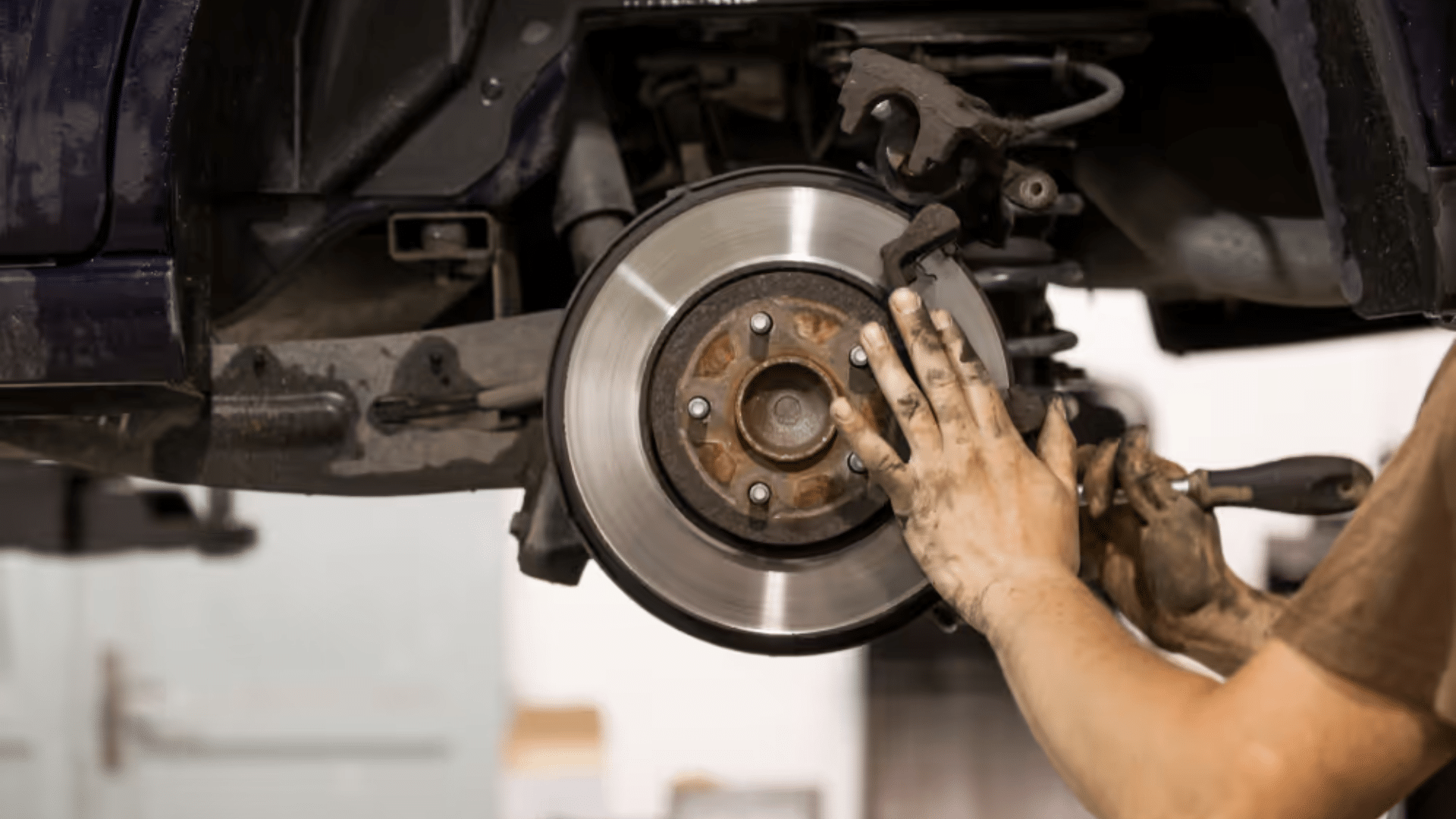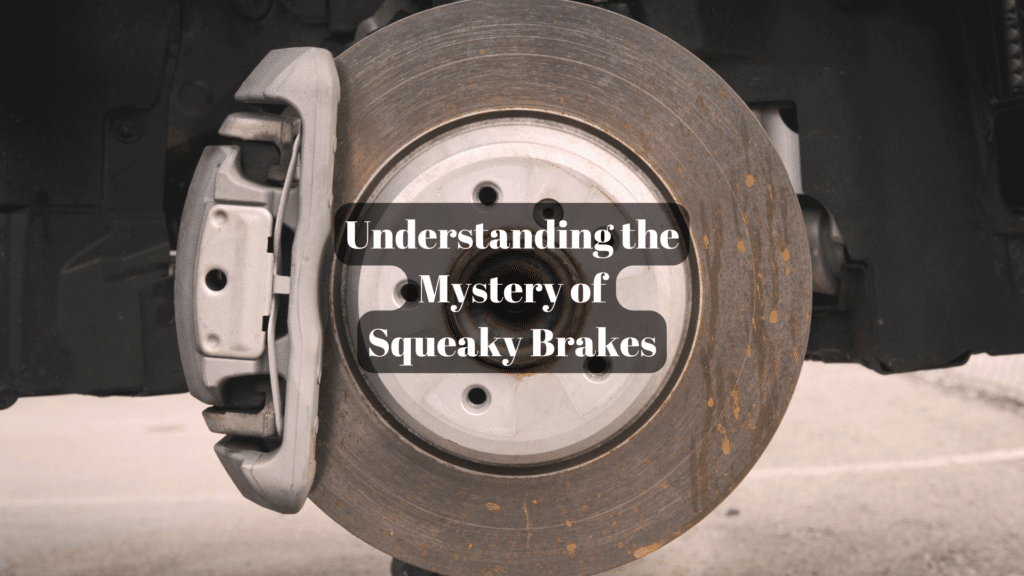Hearing that high-pitched sound from your new brakes?
You’re not alone. Many drivers notice their fresh brakes squeak, particularly when slowing down at low speeds.
While this noise might seem concerning, it doesn’t always mean something is wrong.
In this post, I’ll walk you through:
- Why your new brakes might be making that annoying sound
- Simple fixes you can try at home
- Clear signs that tell you when it’s time to call a mechanic
I know brake problems can be stressful.
With over 15 years of working on brake systems, I’ve seen (and fixed) just about every brake issue you can think of.
Ready to get rid of that squeaking once and for all? Let’s begin.
Why Do New Brakes Squeak at Low Speeds?
That squeaking sound from your new brakes can be frustrating.
I’ve heard many car owners ask why this happens, especially when they’ve just paid for a brake job. Let’s look at the main causes.
Brake Pad Material Matters
The type of brake pads installed on your car makes a big difference.
Semi-metallic pads contain small metal pieces that can create noise as they press against the rotor.
These pads are tough and last a long time, but they’re often noisier than other types.
Ceramic pads tend to be quieter but can still squeak when new. They cost more but make less dust and noise in the long run.
Moisture and Rust Issues
Have you noticed more squeaking on damp mornings? That’s not a coincidence.
Overnight moisture can build up on your rotors. A thin layer of rust forms quickly on the metal surface.
When you first drive in the morning, your pads scrape this rust away – causing that high-pitched sound.
The good news? This type of squeaking usually stops after a few brake uses.
Dust and Debris
Small bits of dust or tiny rocks can get caught between your pad and the rotor.
Even a small amount of debris can cause squeaking at low speeds when the braking force isn’t strong enough to crush or dislodge these particles.
What about your car?
Understanding which of these issues might be causing your squeaking brakes is the first step toward fixing the problem.
How to Fix New Brakes that Squeak when Stopping Slowly?

Those squeaky new brakes can test your patience. I’ve fixed this issue many times, and the good news is that you can often solve it yourself.
Here are four methods that work well.
1. Complete the Proper Bed-In Process
New brake pads need time to adjust to your vehicle’s rotors. This is what mechanics call the “bed-in” process.
To properly bed in your brakes, follow these steps:
- Find an empty road or parking lot where you can drive safely
- Speed up to about 30 mph
- Brake firmly to slow down to 5 mph (but don’t come to a complete stop)
- Repeat this 8-10 times with about 30 seconds between each braking
- Allow your brakes to cool down completely for about 10-15 minutes
This method helps create a smooth layer of brake pad material on your rotors. After this process, you’ll often notice less noise when braking.
2. Clean Your Brake Components
Dirt and brake dust can cause unwanted noise. You can clean your brake parts without taking your wheel off, but removing the wheel gives better results.
If you decide to clean your brakes:
- Make sure your car is safely supported on jack stands
- Spray brake cleaner on the rotors, calipers, and the back of the pads
- Use a clean cloth to wipe away any loose dust or debris
- Let everything dry completely before driving
Never use regular household cleaners on brake parts – they can damage components or create slippery surfaces.
3. Apply Brake Lubricant to Key Areas
Brake lubricant can help reduce noise, but you must apply it to the right spots.
Here’s what to do:
- Buy a small tube of brake-specific lubricant from an auto parts store
- Apply a thin layer to the backs of the brake pads (the metal part, not the friction material)
- Put a small amount on the contact points where the pad meets the caliper
- Wipe off any excess – you want just enough to do the job
Lubricant helps stop vibrations that cause squeaking. Just remember: never put lubricant on the front of the pads or on the rotor surfaces!
4. Check for Loose or Misaligned Parts
Sometimes, the issue isn’t the brakes themselves but how they’re installed.
Take a close look at:
- Caliper bolts – are they tight?
- Brake pad clips – are they seated properly?
- Hardware and shims – are they in the right position?
If you spot anything loose or out of place, tighten it or adjust it according to your vehicle’s manual. Sometimes, a small adjustment fixes the entire problem.
Which method should you try first?
I usually recommend starting with the bed-in process, as it’s the simplest and safest option for most car owners.
Preventing Brake Squeaks in The Future

Once you’ve fixed your squeaky brakes, you’ll want to keep them quiet. I’ve learned a few key strategies over the years that can help you avoid this problem with future brake jobs.
Select Better Brake Pads
The quality of your brake pads makes a huge difference in noise levels. When it’s time for your next brake replacement:
- Look for ceramic or organic pads if quiet operation is important to you. These typically create less noise than semi-metallic options.
- Check reviews from other drivers with your same car model. This can help you find pads that work well with your specific vehicle.
- Ask about noise-reduction features like insulated backing plates or rubber shims when shopping for pads.
While better pads might cost more upfront, they often save you money in the long run by lasting longer and causing fewer problems.
Keep Your Brake System Clean
Dirt and corrosion are major causes of brake noise. You can fight both with regular cleaning:
- Wash your wheels thoroughly when you clean your car. This removes road salt and grime that can lead to rust.
- Spray the visible brake parts with a hose during car washes to rinse away brake dust.
- Take short drives on dry days after your car has been sitting for a while. This helps wipe off surface rust before it builds up.
I’ve found that cars driven daily tend to have fewer rust-related brake noises than those that sit unused for long periods.
Schedule Regular Brake Checks
Don’t wait for problems to appear before looking at your brakes:
- Have your brake system inspected yearly as part of your regular maintenance.
- Check your owner’s manual for recommended brake service intervals.
- Pay attention to early warning signs like slight noises or changes in braking feel.
Many shops offer free brake inspections. Taking advantage of these can help catch issues before they turn into noisy problems.
Improve Your Driving Habits
How you drive affects your brakes more than you might think:
- Avoid riding your brakes on long downhill stretches. Instead, downshift and use engine braking when possible.
- Leave space between cars so you can brake gradually instead of slamming on the brakes.
- Try to anticipate stops by watching traffic patterns ahead of you.
Good driving habits can double the life of your brakes while keeping them quieter.
These simple steps have saved my clients hundreds in unnecessary brake repairs. Which of these methods do you think would work best for your driving situation?
When to See a Mechanic for Brake Noise?
While many brake squeaks are harmless, some noises signal bigger problems. I’ve seen many drivers ignore warning signs until they face costly repairs.
Here’s when you should get professional help rather than trying to fix the issue yourself.
1. Squeaking that Won’t Stop After Break-In
New brakes often make noise during the first few hundred miles.
This is normal. But if your brakes continue squeaking after 500 miles of driving, something else might be wrong.
What to watch for:
- Noise that stays the same or gets louder after several weeks
- Squeaking happens at all speeds, not just when stopping slowly
- Noise that changes to grinding or scraping
When a noise persists past the break-in period, it often points to a manufacturing defect or improper installation. These aren’t issues you can typically fix with home remedies.
2. Signs of Unusual Wear Patterns
Your brake parts should wear down evenly over time. If you notice uneven wear, it’s time to visit a mechanic.
Check for these warning signs:
- Rotors with visible grooves or scoring marks
- Pads that look thinner on one side than the other
- Shiny spots on parts of the rotor but not others
Uneven wear isn’t just about noise – it can lead to brake failure if ignored. A mechanic has the tools to measure these parts precisely and determine if they’re still safe to use.
3. Changes in Braking Performance
The most serious reason to see a mechanic is when your car doesn’t stop as well as it should.
Get professional help immediately if:
- Your car takes longer to stop than usual
- The brake pedal feels spongy or soft when pressed
- You need to push the pedal closer to the floor to stop
- The car pulls to one side when braking
These symptoms suggest your braking system has issues beyond normal break-in squeaks. I’ve seen too many close calls from drivers who waited too long to address these warning signs.
Conclusion
Squeaky new brakes don’t always mean trouble.
As we’ve seen, this common issue often stems from the pad material, moisture on rotors, the normal break-in process, or just some dust between components.
You can fix many brake squeaks yourself by:
- Properly completing the bed-in process
- Cleaning your brake components
- Checking for loose parts
For future quiet stops, choose quality pads, keep your system clean, and practice smoother braking habits.
Remember, while some noise is normal, ongoing squeaks after 500 miles, unusual wear patterns, or any changes in stopping power mean it’s time to visit a professional.
Your brakes are too important to ignore.
I hope this guide helps you silence those squeaky brakes and get back to enjoying quiet, confident stops. Safe driving!
Frequently Asked Questions
Are Ceramic Brake Pads Worth the Extra Cost?
Ceramic pads cost more upfront but often pay off with quieter operation, less dust, and longer life.
For many daily drivers, the premium price is worth the improved experience.
Can Weather Changes Cause My Brakes to Squeak?
Yes. Cold mornings and high humidity can cause temporary brake squeaks due to moisture on the rotors.
This typically stops after a few minutes of driving.
How Often Should Brake Fluid Be Replaced?
Most manufacturers recommend changing brake fluid every 1-2 years.
Fresh fluid prevents corrosion inside the brake system and maintains proper braking performance.

